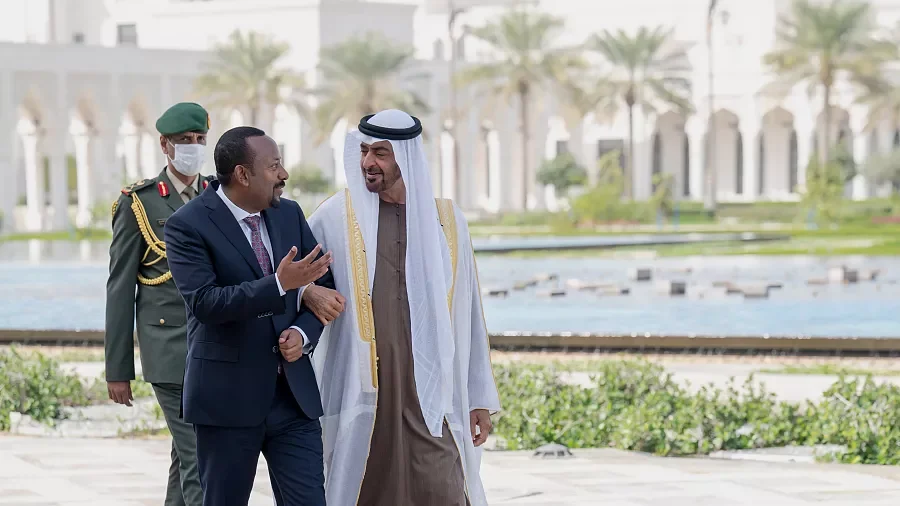By Gregory R. Copley
[Published with Permission from Defense & Foreign Affairs Special Analysis Journal]

Ethiopia’s “hidden” war has brought forward important nuances of regional rivalry which have gone unnoticed as the Israel-Gaza- HizbAllah-Iran-Türkiye conflict dominates headlines.
These include the discreet, but growing, regional rivalry between the United Arab Emirates (UAE), Saudi Arabia, and Türkiye. Among others.
As well, Ethiopia’s protracted, fratricidal civil war is worsening in terms of casualties, throwing up real battlefield lessons, as the strategic outcomes become dangerous for overall regional (and Red Sea) security.
What appears significant from a regional perspective is that the Ethiopian civil war has shown a split, perhaps even a strategic rivalry, emerging between Saudi Arabia and the UAE. The UAE has usurped Saudi Arabia’s position as the favored ally of Ethiopian Prime Minister Abiy Ahmed Ali, even though Abiy had earlier curried favor with Saudi Prime Minister and effective ruler, Crown Prince Mohammed bin Salman bin ‘Abd al-’Aziz al Sa’ud (MBS), particularly over the sensitive position of some 500,000 Ethiopian workers in the Kingdom. MBS had threatened to ship them all back to Ethiopia, contributing to a worsening unemployment crisis and depriving Ethiopia of the much- needed foreign workers’ remittances.
The Saudi-UAE cooling is just one of the factors which is emerging from the Ethiopian conflict, which is unobserved by foreign media sources, given Prime Minister Abiy’s heavy censorship. But it is this factor which will be significant in the coming year as the new US Administration of Pres.-elect Donald Trump attempts to reignite the Abraham Accords, which he oversaw at the end of his first presidential term in 2020. The Saudi- UAE coolness is also of profound significance to Egypt, Israel, and Sudan.
The internal war itself is of increasing importance, as well. With the end of the Government war against the former ruling Tigré (Tigray) Popular Liberation Front (TPLF) in late 2020, Abiy turned his attention to suppressing the Amhara people, even though Abiy himself is half- Amhara (and half-Oromo; the ethnicity he claims). This war is now in full flight, with mass defections, often of entire units with their weapons and vehicles, from the Federal forces to the three major Fano groups of Amhara militia.
The three main Fano groups have finally agreed on a united military command structure, but have no political command or stated purpose, other than to push back against the Abiy Government’s essentially genocidal campaign against both Ethnic Amharas and people professing loyalty to the national church, the Ethiopian Orthodox Tewahedo Church. Abiy, who came to power professing to be a Pentecostal Christian from a mixed (Christian-Muslim) parentage, has now — possibly with foreign influence — disavowed his Christian background and has embraced Islam.
Significantly, this is not an “Ethiopian Muslim” identity, as expressed by, for example, the spiritual leader of the unique and moderate branch of Ethiopian Islam under the Sultan of the Afar, but a more radical version, following either Arabian Peninsula Sunni approaches or the Muslim Brotherhood variety promoted by Turkish Pres. Reçep Tayyip Erdoðan, who has become more influential in both Somalia and Ethiopia.
Somalia, in particular, has come seriously under Turkish sway, and Türkiye has clearly attempted to stop the Somalian hostility toward Abiy as a result of his attempt to recognize neighboring Somaliland — which is separate from Somalia — in order to give Addis Ababa a separate access to the sea through the Somaliland port of Berbera.
A fleet of five Turkish Bayraktar TB2 unmanned combat aerial vehicles (UCAVs), managed from Addis Ababa by a private contractor, was significantly responsible for the Federal Government’s success in late 2022 against the well-armed TPLF fighters, largely because the TPLF troops were deploying in columns of soft-skinned trucks, which made easy targets for the TB2s. Importantly, the TPLF used the trucks which had been “donated” to them by the US Government to deliver US aid to the Tigré region during that war.
Now, Prime Minister Abiy has acquired additional TB2s and other Turkish UAVs but has not had the same success against the Fano forces of the Amhara. This is largely because the Fano forces have not based their widespread assaults against Government targets on the use of clearly-vulnerable truck convoys, but have moved largely as dispersed units, not concentrating their assets into potential high-loss sites.
Significantly, the Fano forces have adopted traditional Ethiopian military ranks for their commanders, such as dejazmatch (generally an overall commander), fitawrari (leader of the center), gerazmatch (commander of the left wing of the army), and so on, reminiscent of the Solomonic royal and imperial periods. This highlights their desire to restore the Solomonic framework of Ethiopia, rather than the later republican ethnic approach of dividing and conquering the 80 or so ethnicities.
At the same time, Abiy has become isolated even from his own military commanders, and acts with increasingly mercurial behavior, making snap decisions and then abusing commanders when the results he desired are not forthcoming. In the meantime, he relies more on his foreign supporters who are seeking to gain their own advantage in the region, namely the UAE, Türkiye, and others. As a result, Addis Ababa, which is now isolated from the rest of the country by the war, is being built up as a “showcase”, with UAE creating “a new Dubai”, supplanting the old and poorly-built Chinese (PRC) structures.
Russia and the PRC are playing a secondary rôle in sustaining Abiy, and Saudi Arabia is focusing on competing with the UAE in neighboring Eritrea. None of this is calming of the turbulence in the Red Sea region, which is critical to global trade. Meanwhile, Israel, Egypt, and even the US, have been too preoccupied to weigh in on the situation in the Horn of Africa and Red Sea.
